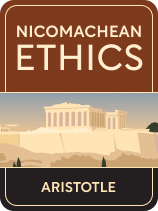

This article is an excerpt from the Shortform book guide to "Nicomachean Ethics" by Aristotle. Shortform has the world's best summaries and analyses of books you should be reading.
Like this article? Sign up for a free trial here .
What makes a happy life? Must you have or do something in particular?
According to Aristotle, a person must have certain life circumstances to be capable of happiness. Specifically, he notes two requirements of a happy life: prosperity and longevity.
Continue reading to learn more about Aristotle’s two ingredients for happiness.
Prosperity
What makes a happy life? First, a person needs some level of prosperity and wealth—enough that they have leisure time for philosophical inquiry and can easily meet their physical needs. This also means a life defined by great tragedy or misfortune cannot be happy. While a happy person can deal with some tragedy and misfortune in a virtuous way, too much will prevent them from pursuing the activities necessary for a happy life.
(Shortform note: Historical and cultural context helps explain Aristotle’s views on the necessity of prosperity for happiness. Fourth century BCE Athens had three main social classes: 1) Citizens, free Athenian-born men who could participate politically and often had wealth and power; 2) metics, free people who weren’t born in Athens and couldn’t participate politically, but could still gain wealth and influence; and 3) slaves, people treated as property who couldn’t participate politically and often had little to no rights or belongings. By claiming prosperity is necessary for a happy life, Aristotle is likely making an observation about the only people in ancient Athens that could do philosophy—men who were citizens or wealthy metics (like Aristotle himself).)
Longevity
A happy life is a long life. A happy life is a good life, and, for a person to be as good as possible, they need to consistently do good things over the course of an entire human lifespan. Therefore, Aristotle suggests that people who die young can’t achieve happiness—they have less time to live and therefore will do fewer good acts. This doesn’t mean people who die young necessarily live bad or miserable lives, but it does mean that they weren’t able to achieve the best possible (and therefore happiest possible) human life.
(Shortform note: To understand why Aristotle says people who die young can’t be happy, consider his overall project. Aristotle believes that everything has a telos, or ultimate goal. Collectively, this adds up to a teleological view of the world, where everything in existence has a natural and intended function. In Nicomachean Ethics, Aristotle tries to discover how humans can best accomplish their telos—this informs his entire definition of a good life. From this perspective, it’s clear why longevity is necessary for happiness: The fact that humans have a defined lifespan means that we are naturally meant to live for that entire period. Therefore, the best human life (which best fulfills our natural functions) lasts for that full amount of time.)

———End of Preview———
Like what you just read? Read the rest of the world's best book summary and analysis of Aristotle's "Nicomachean Ethics" at Shortform .
Here's what you'll find in our full Nicomachean Ethics summary :
- Aristotle's philosophies on topics such as happiness, virtue, and wisdom
- What it means to be morally virtuous and how someone can develop moral virtue
- How wisdom contributes to the possibility of a happy life






